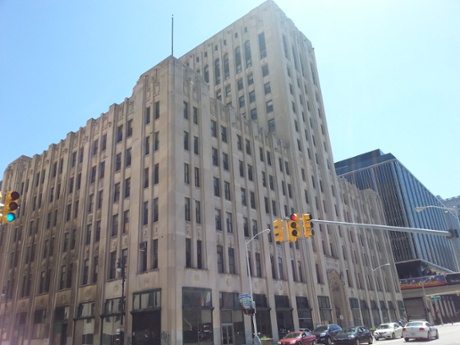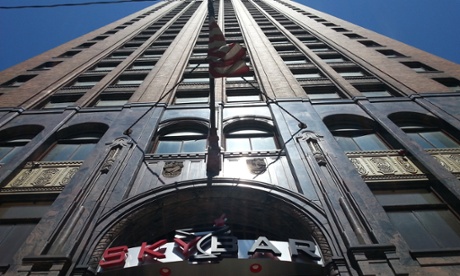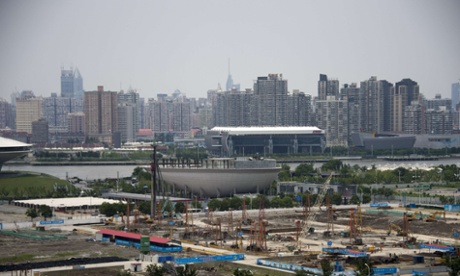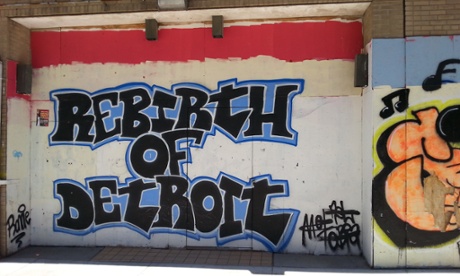Does multimillion dollar Chinese investment signal Detroit’s rebirth?
With a weak US dollar, strong yuan and China’s own real estate market cooling after years of explosive growth, Detroit is an attractive – but high-risk – option for Chinese property developers
Last autumn, a group of Chinese real estate developers arrived in downtown Detroit for a city tour. As they walked through its small central cluster of high-rises – some in use, many long-ago abandoned – they were impressed by what they saw. Amid the urban decay, they were shown art spaces, colourful tech startup offices, and other testaments to reinvention. “Rebirth of Detroit” read one elaborately-stencilled mural. Wedged into an empty window frame of a crumbling mid-rise, a wood block carving depicted an Atlas-like figure hoisting a giant ‘D’ on his shoulders. “Rising from the ashes,” it said.
In September, the Shanghai-based developer Dongdu International (DDI) made its first move. In an online auction, it snapped up three iconic downtown properties, all built during the city’s early 20th-century heyday as an industrial powerhouse. DDI purchased the David Stott building, a 38-storey art-deco skyscraper built in 1929, and the former Detroit Free Press newspaper headquarters, a T-shaped edifice adorned with bas-relief sculptures of biplanes and locomotives. Later, it acquired the 10-storey Clark Lofts, an inconspicuous residential building with a manual, pre-second world war elevator – the oldest in Detroit.
Altogether, DDI spent $16.4m (£9.6m) on the properties, slightly more than a top-market apartment in Shanghai.
The company plans to transform the buildings into vibrant offices and upscale apartments, according to the CEO of DDI’s leisure branch, Peter Wood. “Once we’ve shown to the locals in Detroit that we’re deadly serious, then other things will happen,” Wood says, sitting in his corner office on the 10th floor of a Shanghai skyscraper, a dozen or so Chinese employees typing diligently in cubicles outside. “Detroit is planning for this area to come back. It’s all about rejuvenation.”

China has in recent years become the second largest foreign investor in US real estate after Canada – the dollar is weak, the yuan is strong, and the country’s own real estate market is cooling down after years of explosive growth. While most buyers – individuals as well as companies – focus on reliable investments in cities such as San Francisco, Los Angeles and New York, others are seeking new frontiers. Many have family in the US and degrees from US universities; they are attracted to complex, high-risk projects which require a deep understanding of local real estate markets, politics and laws.
Even for them, though, Detroit is an ambitious target. While some parts are staging a comeback – the Quicken Loans billionaire Dan Gilbert moved his corporate headquarters there in 2010 – tens of thousands of the city’s properties still lie abandoned among overgrown lots. Images of Detroit’s urban blight have become a defining visual symbol of American rust-belt decline.
Not surprisingly, DDI has run into problems with its investments: the 302,000 sq ft Detroit Free Press building, abandoned since 1998, has fallen into an advanced state of disrepair. After DDI took over the David Stott building, its best-known tenant, Detroit Yoga, relocated citing landlord concerns. One of the building’s only other tenants, SkyBar, is currently suing DDI over a rent dispute. Neither DDI nor SkyBar’s management would comment on the case.
“They had these grand plans to dump millions into the [Stott] building,” Ryan Snoek, a real estate consultant who coordinated the sale, told Crains Business Detroit. “I'm starting to become concerned that may not be the case, that they just bought the buildings and will just hold on to it.”
Ken Creighton, a local representative for DDI, said the company will be begin renovating the buildings in the “first or second quarter” of next year. "We'll do the Free Press building first ... All of the buildings will be redone – their mechanical, electrical and plumbing, their elevators. Most of these buildings haven’t had anything done to them in years, maybe decades.”

Soon after Detroit declared bankruptcy last July, China’s state broadcaster CCTV ran a special report claiming that Detroit properties were selling for less than a pair of leather shoes. Immediately, real estate broker Caroline Chen’s phone began ringing off the hook. Chen, who was born in Taiwan but has lived in Michigan for decades, works for RE/MAX Crown Properties in the affluent suburb of Troy, and she has become the go-to resource for Chinese investors looking to buy up Detroit real estate. Three years ago, she opened a second office in Shanghai.
Chen says that she still receives countless calls from curious Chinese buyers, five to 10% of which eventually end in transactions. Altogether, her firm has sold about 300 homes to Chinese clients, most for between $500 and $10,000. Many of them don’t understand how bleak much of Detroit has become. “Most buyers, on a small scale, they think they can leave the property sitting there, and since everybody’s buying, its value will go up,” she says. “But that’s wrong. If everybody does that, then everything just sits there.”
In June 2014, one Chinese developer flew to Detroit to explore the possibility of building a Detroit Chinatown. “Most of what I told him was negative, but that didn’t scare him,” Chen said. “‘It’s because Detroit’s bad, that’s why I want to develop,’ he told me. ‘We have seen so many examples of this – just look at Pudong in Shanghai.’” Two decades ago, the city’s Pudong district was mostly marshland. Now, it’s home to some of the most expensive real estate in the world.
DDI’s Detroit investments seem more calculated. The company already maintains properties in Shanghai, Nanjing, Chengdu, and California. It’s also building a resort in Nova Scotia. Li Hailin, its 51-year-old chairman, has hosted government officials from Detroit’s Wayne County at his home in central Shanghai. Li quit a government job at the age of 26 to become an entrepreneur in Shenzhen, the site of China’s first experiments in free market capitalism. He made his fortune building migrant worker dorms.

“Our chairman sees a lot of things that other businesses don’t – or don’t want to try,” says Solomon Wong, DDI’s business manager for international projects. On a rainy day in March, Wong walks through a new row of 16-storey residential buildings in Shanghai’s far-flung suburbs. DDI finished building them three years ago, he says; already, they are almost fully occupied. The complex is porcelain themed – at its centre is a small museum, featuring copies of ceramic masterpieces under glass display cases. Its walls are lined with photographs of other DDI properties – a gleaming commercial centre and a row of houses along a canal.
“We need to follow the rules of historical protection on these first few projects in Detroit,” Wong says. “But for other projects, later, we could possibly build these kinds of things.” The company has ambitions beyond real estate: DDI could soon bring Chinese auto industry savvy to the midwest, he says. China, in turn, could someday benefit from Michigan’s celebrated universities and healthcare system.
Analysts and competitors said that the firm would fail in Shenzhen, and then in Shanghai, according to Wong. Again and again, Dongdu has proved them wrong. Why should Detroit be any different?

No comments:
Post a Comment
Comments always welcome!